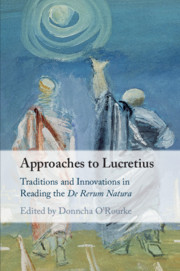Book contents
- Approaches to Lucretius
- Approaches to Lucretius
- Copyright page
- Contents
- Figures
- Notes on Contributors
- Preface
- Abbreviations
- Introduction
- Part I The Text
- Part II Lucretius and his Readers
- Part III The Word and the World
- Part IV Literary and Philosophical Sources
- Part V Worldviews
- Chapter 11 Was Memmius a Good King?
- Chapter 12 A Tribute to a Hero: Marx’s Interpretation of Epicurus in his Dissertation
- Chapter 13 Plato and Lucretius on the Theoretical Subject
- Works Cited
- Index Locorum
- Index Rerum
Chapter 13 - Plato and Lucretius on the Theoretical Subject
from Part V - Worldviews
Published online by Cambridge University Press: 25 June 2020
- Approaches to Lucretius
- Approaches to Lucretius
- Copyright page
- Contents
- Figures
- Notes on Contributors
- Preface
- Abbreviations
- Introduction
- Part I The Text
- Part II Lucretius and his Readers
- Part III The Word and the World
- Part IV Literary and Philosophical Sources
- Part V Worldviews
- Chapter 11 Was Memmius a Good King?
- Chapter 12 A Tribute to a Hero: Marx’s Interpretation of Epicurus in his Dissertation
- Chapter 13 Plato and Lucretius on the Theoretical Subject
- Works Cited
- Index Locorum
- Index Rerum
Summary
Plato’s writings play a crucial role in bootstrapping the discourses that came to be called metaphysics, which see their task as exploring distinctions between seeming and being, reality and appearance, and what we can sense and what lies beyond our senses. Central to them is the notion of ‘theory’, which, as Andrea Nightingale has argued, Plato develops out of the social institution of theōria: a representative of the city attends a Panhellenic festival, observes what happens, and reports back on what he has seen. This model structures the story (in Republic) of the prisoner leaving the cave, ascending to the light, and reporting back to those he left behind – a structure that Lucretius reprises in the ‘theoretical’ journey of Epicurus across the universe in DRN 1. Plato’s stories are subject to a process of reception Hans Blumenberg has described as ‘re-occupation’ so as to express metaphysical positions that are at odds with Plato’s. This essay explores Lucretius’ re-occupation of a number of Platonic motifs (the cave, the pitfall of Thales in Theaetetus, the representation of Socrates as a thinking subject) to highlight the role that these motifs have played (and continue to play) in the metaphysical tradition.
Keywords
- Type
- Chapter
- Information
- Approaches to LucretiusTraditions and Innovations in Reading the <I>De Rerum Natura</I>, pp. 259 - 281Publisher: Cambridge University PressPrint publication year: 2020
- 1
- Cited by



